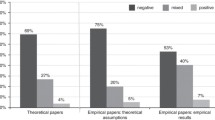Abstract
A careful review of the history of research on global strategy and cross-cultural management reveals that considerable attention has been paid to the functioning of organizations located in the Asian context in comparison with their Western counterparts. While research in this tradition has generated some useful insights, there is a need for improving robustness of management theories that are applicable in the Asian context. In this paper, we advance a taxonomy of cross-cultural management theories and suggest methods of deriving research propositions well-grounded in the latest findings in cross-cultural research. It is suggested that robustness of management theories that are uniquely applicable to the Asia Pacific countries is best achieved by addressing the complex interplay of cultural variations found in these countries with globalization-related influences.
Similar content being viewed by others
References
Ali, A. J. 2008. Islamic perspectives on management and organizations. Cheltenham, UK: Edward Elgar.
Arvey, R. D., Bhagat, R. S., & Salas, E. 1991. Cross-cultural and cross-national issues in personnel and human resources management: Where do we go from here?. In K. M. Rowland & G. Ferris (Eds.). Research in personnel and human resources management: 367–407. Stamford, CT: JAI.
Au, K. 2007. Self-confidence does not come isolated from the environment. Asia Pacific Journal of Management, 24: 491–496.
Bhagat, R. S. 2009. Culture, work and organizations: A future research agenda. In R. S. Bhagat & R. M. Steers (Eds.). Handbook of cultures, organizations, and work: 518–526. Cambridge: Cambridge University Press.
Bhagat, R. S., & McQuaid, S. 1982. Role of subjective culture in organizations: A review and direction for future research. Journal of Applied Psychology, 67: 653–685.
Bhagat, R. S., & Steers, R. M. 2009. Handbook of cultures, organizations, and work. Cambridge: Cambridge University Press.
Bhagat, R. S., Kedia, B. L., Crawford, S. E., & Kaplan, M. R. 1990. Cross-cultural issues in organizational psychology: Emergent trends and directions for research in the 1990’s. In C. L. Cooper & I. T. Robertson (Eds.). International review of industrial and organizational psychology, 5: 59–99. New York: Wiley.
Bhagat, R. S., Kedia, B. L., Perez, L. M., & Moustafa, K. S. 2004. The role of subjective cultures in organizations. In B. J. Punnett & O. Shenkar (Eds.). Handbook of international management research, 2nd ed.: 189–209. Ann Arbor: University of Michigan Press.
Buchan, N. 2009. Complexity of trust: Cultural environments, trust and trust development. In R. S. Bhagat & R. M. Steers (Eds.). Handbook of cultures, organizations, and work: 373–417. Cambridge: Cambridge University Press.
Chang, W. C., Wong, W. K., & Koh, J. B. 2003. Chinese values in Singapore: Traditional and modern. Asian Journal of Social Psychology, 6: 5–29.
Chen, C. C., Chen, Y. R., & Xi, K. 2004. Guanxi practices and trust in management: A procedural justice perspective. Organization Science, 15: 200–209.
Child, J. 1981. Culture, contingency and capitalism in the cross-national study of organizations. In L. L. Cummings & B. M. Straw (Eds.). Research in organizational behavior: An annual series of analytical essays and critical reviews. Greenwich: JAI.
Chiu, C., & Hong, Y. 2006. Social psychology of culture. New York: Psychology.
Earley, P. C. 1989. Social loafing and collectivism: A comparison of the United States and the People’s Republic of China. Administrative Science Quarterly, 34: 565–581.
Earley, P. C. 1993. East meets West meets Mideast: Further explorations of collectivistic and individualistic work groups. Academy of Management Journal, 36: 319–348.
Earley, P. C. 1997. Face, harmony and social structure: An analysis of organizational behavior across cultures. Oxford: Oxford University Press.
Fu, P. P., & Liu, J. 2008. Cross-cultural influence strategies and power sources. In P. B. Smith, M. F. Peterson & D. C. Thomas (Eds.). The handbook of cross-cultural management research: 239–252. Los Angeles: Sage.
Galbraith, J. K. 1967. Economic development. Boston: Houghton-Mifflin.
Goldman Sachs. 2002. 2002 annual report. New York: Goldman Sachs.
Gupta, A. K., Govindarajan, V., & Wang, H. 2008. The quest for global dominance: Transforming global presence into global competitive advantage. San Francisco: Jossey-Bass.
Hofstede, G. 1991. Cultures and organizations. Software of the mind. London: McGraw- Hill.
Hofstede, G. 2001. Culture’s consequences: Comparing values, behaviors, institutions, and organizations across nations, 2nd ed. Thousand Oaks: Sage.
Hofstede, G. 2007. Asian management in the 21st century. Asia Pacific Journal of Management, 24: 411–420.
Hofstede, G., & Bond, M. 1988. The Confucian connection: From cultural roots to economic growth. Organizational Dynamics, 16(4): 4–21.
Hooker, J. 2003. Working across cultures: A professional’s guide to cultural understanding. Stanford: Stanford University Press.
Huntington, S. 1996. The clash of civilizations and the remaking of world order. New York: Simon and Schuster.
Kitayama, S. 2002. Cultural and basic psychological processes—towards a system view of culture: Comment on Oyserman et al. Psychological Bulletin, 128: 189–196.
Kitayama, S., & Cohen, D. (Eds.). 2007. Handbook of cultural psychology. New York: Guilford.
Kitayama, S., Duffy, S., & Uchida, Y. 2007. Self as cultural mode of being. In S. Kitayama & D. Cohen (Eds.). Handbook of cultural psychology: 136–174. New York: Guilford.
Leung, K. 2008. Methods and measurements in cross-cultural management. In P. B. Smith, M. F. Peterson & D. C. Thomas (Eds.). The handbook of cross-cultural management research: 59–73. Los Angeles: Sage.
Leung, K., & Su, S. K. 2004. Experimental methods for research on culture and management. In B. J. Punnett & O. Shenkar (Eds.). Handbook for international management research: 68–93. Ann Arbor: University of Michigan Press.
Leung, K., & van de Vijver, F. J. R. 2008. Strategies for strengthening causal inferences in cross-cultural research: The consilience approach. International Journal of Cross-Cultural Management, 8(9): 145–168.
Leung, K., Bhagat, R. S., Buchan, N., Erez, M., & Gibson, C. B. 2005. Culture and international business: Recent advances and their implications for future research. Journal of International Business Studies, 36: 357–378.
Li, Y., & Peng, M. W. 2008. Developing theory from strategic management research in China. Asia Pacific Journal of Management, 25: 563–572.
Markus, H. R., & Kitayama, S. 1991. Culture and the self: Implications for cognition, emotion, and motivation. Psychology Review, 98: 224–353.
Meyer, K. E. 2007. Asian context and the search for general theory in management research: A rejoiner. Asia Pacific Journal of Management, 24: 257–534.
Myrdal, G. 1966. Asian drama. New York: Pantheon.
Peng, M. W. 2005. From China strategy to global strategy. Asia Pacific Journal of Management, 22: 123–141.
Peng, M. W. 2007. Globalizing the Asia Pacific Journal of Management. Asia Pacific Journal of Management, 24: 1–8.
Ramaswamy, K. 2007. Asian management research needs broader initiatives and focused incentives. Asia Pacific Journal of Management, 24: 519–525.
Reid, T. R. 1999. Confucius lives next door. New York: Random House.
Roberts, K. H. 1970. On looking at an elephant: An evaluation of cross-cultural research related to organizations. Psychological Bulletin, 74: 327–50.
Sanchez-Burks, J., & Lee, F. 2007. Cultural psychology of workways. In S. Kitayama & D. Cohen (Eds.). Handbook of cultural psychology: 346–369. New York: Guilford.
Shenkar, S., & Ronen, S. 1987. Structure and importance of work goals among managers in the People’s Republic of China. Academy of Management Journal, 30(3): 564–576.
Shenkar, O. 2005. The Chinese century. Upper Saddle River, NJ: Wharton School.
Sheth, J. G. 2008. Chindia rising. Decatur, GA: Incore.
Smith, P. B., & Misumi, J. 1987. Japanese management: A sun rising in the West. In C. L. Cooper & I. Robertson (Eds.). International review of industrial and organizational psychology. Chichester: Wiley.
Smith, P. B., Bond, M. H., & Kagitcibasi, C. 2006. Understanding social psychology across cultures. London: Sage.
Smith, P. B., Peterson, M. F., & Thomas, D. C. (Eds.). 2008. The handbook of cross-cultural management research. Los Angeles: Sage.
So, Y. L., & Walker, A. 2005. Explaining guanxi: The Chinese business network. London: Routledge.
Triandis, H. C. 1990. Cross-cultural studies in individualism and collectivism. In J. J. Berman (Ed.). Cross-cultural perspectives: 41–134. Lincoln: University of Nebraska Press.
Triandis, H. C. 1994. Culture and social behavior. New York: McGraw-Hill.
Xin, K. R., & Pearce, J. L. 1996. Guanxi: Connections as substitutes for formal institutional support. Academy of Management Journal, 39: 1641–1658.
Yang, X., & Terjesen, S. 2007. In search of confidence: Context, collaboration, and constraints. Asia Pacific Journal of Management, 24: 497–507.
Zakaria, F. 2008. The post-American world. New York: Norton.
Zhang, X., Zheng, X., & Wang, L. 2003. Comparative research on individual modernity of adolescents between town and countryside in China. Asian Journal of Social Psychology, 6: 61–73.
Author information
Authors and Affiliations
Corresponding author
Additional information
The authors would like to thank Mike Peng, the Editor-in-Chief of APJM, for his helpful comments on an earlier draft of this manuscript.
Rights and permissions
About this article
Cite this article
Bhagat, R.S., McDevitt, A.S. & McDevitt, I. On improving the robustness of Asian management theories: Theoretical anchors in the era of globalization. Asia Pac J Manag 27, 179–192 (2010). https://doi.org/10.1007/s10490-009-9158-z
Published:
Issue Date:
DOI: https://doi.org/10.1007/s10490-009-9158-z




